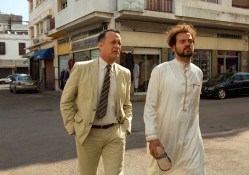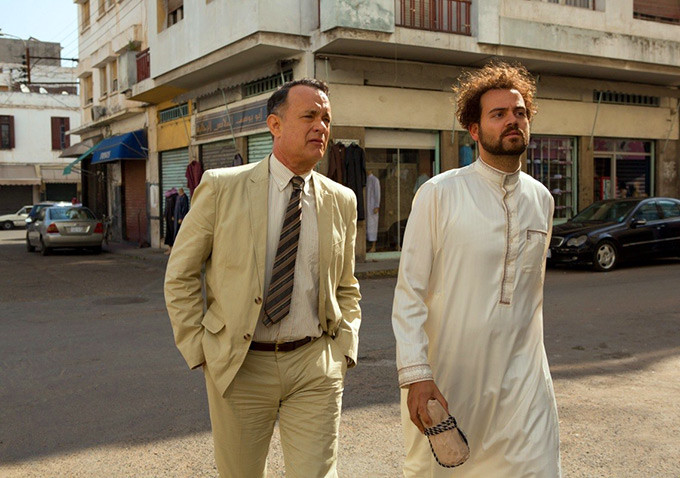If you haven't read the Dave Eggers novel on which it’s based—and I haven’t—A Hologram for the King is less adaptation, more light diversion. You wait the whole time for the inciting incident to arrive, the big thing that will kick off the action, only to realize that it happened without you noticing.

That sounds negative. I don’t exactly mean it that way. Life, after all, is full of moments you only realize were important in retrospect: that party you almost didn’t go to, the dashed-off blog post that led to a friendship, the accidental meeting in a doctor’s office.
But translating life’s happenstance into an effective bit of entertainment is trickier, and the movie has a disconcerting tendency to turn a hero’s existential, enigmatically signposted journey into a sandy path strewn with red herrings. When A Hologram for the King succeeds, it’s for two reasons: the presence of American’s true sweetheart Tom Hanks, and the inherent humor of its fish out of water premise, which psychologists tell us is a surefire recipe for comedy in human brains.
Hanks plays Alan Clay, a middle-aged American fellow who we come to understand once was a bigshot at Schwinn (the bicycle company). He did what seemed to be a good idea at the time and outsourced production to China. It wasn’t a good idea. Now he’s divorced, and his beloved daughter has had to take a college hiatus since he can’t make tuition payments. He’s lost his way. He’s a disappointment to himself. He's stuck being a salesman for a company that creates 3-D holographic conferencing systems. And he’s trying to meet with the King of Saudi Arabia, to sell him the technology.
This initial hoped-for encounter starts to sour when it becomes clear that the King of Saudi Arabia pretty much shows up whenever he wants, and in a Godot– (or Groundhog Day-) like manner, Alan slips into a routine of oversleeping, calling up Yousef the driver (Alexander Black) whose car may or may not blow up (he’s toying with the wrong vengefully-husbanded woman), going to random parties, and poking at a growth on his back, which could be most anything. He sees condos being built at a future development site in the desert. He interacts with obsequious but unhelpful staff. It is hard to get booze in Saudi Arabia; he overdoes it a bit when it is slipped to him by a Danish consultant, sterilizes a steak knife in a lighter, and attempts surgery. (Mercifully, we only see the aftereffects.)

This lands him in the hospital, where a doctor (Sarita Choudhury)—who, to Yousef’s surprise at least, is a woman. But it’s benign, as is the anxiety attack that brings them back in contact later. In between, Alan treks out to see his team at the presentation site. They are basically just waiting around. Everyone is basically just waiting around.
You could describe the film as yet another chronicle of a middle-aged man having an existential crisis in another country. Which it is, for sure, but that feels like a flat characterization: A Hologram for the King, as the title implies, is kind of about America’s fish out of water position abroad, a whole nation’s difficulty picking up the social cues and customs of a world that’s becoming less interested in catering to their products and whims. It’s an uncomfortable place, because all the pop cultural cues are still there—”we watch the same movies,” Yousef remarks, and subjects him to a steady stream of American pop music on cassette on their drives. But Youssef also gets uncomfortable when Alan looks at sacred religious sites with too much touristy interest, and Alan can’t really figure out how he’s supposed to operate in this world.
As I said, I haven’t read the novel, but Eggers is a kind of lighthearted chronicler of the darker sides of our present technologification and globalization. In books like The Circle, What is the What, A Heartbreaking Work of Staggering Genius, and A Hologram for the King, Eggers mucks around in the things that we all agree to seem happy about (eerily nurturing corporate culture! cheap manufacturing overseas! modern medical life extension! domestic immigration!) and explores them without resorting to yawnworthy handwringing. Eggers is at heart optimistic and a humanist, with a deep interest in relationships between people; his involvement in ironic-but-serious publishing enterprises like McSweeney’s and The Believer along with philanthropic educational initiatives around the country aren’t the mark of a man who thinks the country is going down the tubes. That all comes through in A Hologram for the King. It’s not a tragedy.
But it’s not totally hopeful, either, mostly because what it’s really about is a globalized world and America’s place in it. It tells its story with a sort of surrealist flair, propelled by German director Tom Tykwer (Run Lola Run, The International), who also wrote the screenplay. And to judge whether or not its representations of Saudi culture are accurate or merited would be to punch far above my weight class. (Though one wonders if the movie would look the same if made by an Arab filmmaker.)

Unfortunately, it never really gels, mostly because things happen and then get left behind on the path, small points of learning for our protagonist. And maybe that’s the point; in a novel, set pieces can act as willful diversions, bits of comedy, educational experiences that don’t need to tie into the whole. But you can’t do that in a movie. A good rule of thumb is that the shorter the time required to consume a story (from novels to short films to ditties), the more related to one another the pieces must be, if you’d like to leave your audience feeling like they got the point. Unless the filmmaking is extraordinary, the bits just feel misleading—breadcrumbs to nothing, red herrings galore.
That doesn’t mean A Hologram for the King isn’t fun, and sometimes rather sweet. Just don’t trip over the fish.
Caveat Spectator
A scene in which a woman swims topless for cultural reasons is non-sexualized, but still somewhat provocative. One sex scene, in which we see nothing; one attempted sex scene, in which nothing happens. Scattered profanities/obscenities, mostly mild. A joke about homosexuality. Some drinking. At a party, we glimpse people snorting a powder.
Alissa Wilkinson is Christianity Today’s critic at large and an assistant professor of English and humanities at The King’s College in New York City. She is co-author, with Robert Joustra, of How to Survive the Apocalypse: Zombies, Cylons, Faith, and Politics at the End of the World (Eerdmans, May 9). She tweets @alissamarie.












